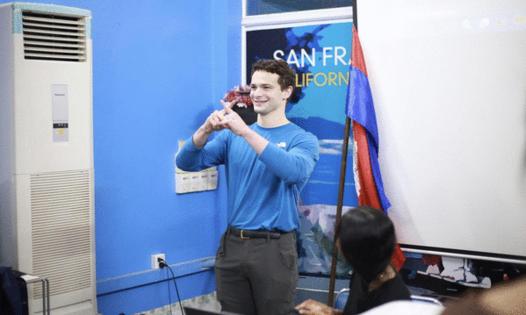Commentary: What's at stake in the Fulbright funding crisis
Published in Op Eds
I am one of thousands of Americans sitting in limbo while working abroad on a Fulbright grant. The recent funding freezes have left many of us stranded in foreign countries without funds or guidance on how to proceed. Rather than just detailing this crisis, I want to illustrate Fulbright’s importance through my experience as an English teaching assistant in Cambodia.
The United States has a difficult history with Cambodia. In the late 1960s and early ’70s, the U.S. dropped an estimated 500,000 tons of bombs on the country, killing 150,000 civilians. This relentless campaign cleared the path for the Khmer Rouge, who exploited a destabilized Cambodia. From 1975 to 1979, they committed one of the worst genocides in human history, with death toll estimates ranging from 1.5 million to 3 million. If any people have legitimate reasons to resent Americans, Cambodians do. Yet, they don’t.
Flying into Cambodia five months ago, dressed in my Fulbright T-shirt and equipped with my distinctly American accent, I braced for suspicion and hostility. What I instead encountered was extraordinary warmth. Without exception, every Cambodian I’ve met has been welcoming and eager to talk to me. During my trips to the local market, vendors pause their work to ask about the United States, share their dreams of visiting someday and insist I try some of their food. When my bike tire blew out on a rural road, three strangers stopped within minutes to help. During my moments of homesickness, my Cambodian colleagues have invited me into their homes to share meals with their families.
While Cambodian hospitality is legendary, these connections represent something deeper: the cumulative impact of decades of cultural exchange. The U.S. Embassy in Phnom Penh provides valuable services but has limited reach in other provinces outside the capital. Through foreign exchange programs such as Fulbright, many Cambodians outside Phnom Penh experience their most direct and meaningful day-to-day interactions with Americans. These connections complement the embassy’s incredible programs and outreach. Each positive encounter — multiplied across the grantees over generations — builds global goodwill that formal diplomacy alone cannot achieve. This person-to-person approach forms an invisible but crucial foundation of American influence worldwide.
But it’s not just a one-way relationship. Like many Americans from modest backgrounds, international travel remained financially out of reach for me until Fulbright. Living in Cambodia has opened my eyes to another culture while making me appreciate our rights and opportunities back home. In the United States, I never thought twice about the safety of tap water or reliable health care. Now, I see these conveniences for what they are: privileges not everyone enjoys. In a moment in which American discontent seems to be the prevailing attitude of the nation, this reminder of our prosperity puts our struggles into perspective.
The impact of a Fulbright grant extends far beyond individual participants. Each grantee serves as a cultural ambassador, breaking down stereotypes and building relationships that persist for decades. My Cambodian students don’t just learn English from me — they gain a more accurate, nuanced understanding of American society that counters dramatized stereotypes. And, when I return home, I’ll bring insights about Cambodia that will inform my work and community engagement for years to come.
At a fraction of the cost of the military budget, Fulbright grants represent one of America’s most effective diplomatic investments. As President Donald Trump’s administration considers the program’s future, it should realize that pausing Fulbright doesn’t just strand Americans — it also undermines decades of careful relationship building in regions where the United States needs friends. In a world of increasing geopolitical tension, these people-to-people connections aren’t luxuries; they’re strategic necessities for maintaining America’s global standing.
____
Carter Popkin, a recent graduate of Northwestern University, is teaching English in Cambodia on a Fulbright grant. The views expressed in this piece are entirely those of the author and do not represent the views of the Fulbright Program, the U.S. Department of State or any of its partner organizations.
___
©2025 Chicago Tribune. Visit at chicagotribune.com. Distributed by Tribune Content Agency, LLC.




























































Comments